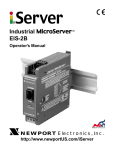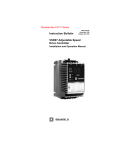Download Frequency inverter ER12
Transcript
BLEMO ® Frequenzumrichter BASE-LINE Variable speed drives for asynchonous motors Frequency inverter ER12 Simplified manual 03/2009 BLEMO Frequenzumrichter Siemensstraße 4 D-63110 Rodgau-Dudenhofen Tel.: 06106/8295-0 Fax: 06106/8295-20 [email protected] www.blemo.com Contents Important information _____________________________________________ 4 Before you begin _________________________________________________ 5 Steps for setting up _________________________________________________7 Mounting _______________________________________________________ 8 Wiring recommendations __________________________________________ 9 Power terminals _________________________________________________ 12 Control terminals ________________________________________________ 16 Electromagnetic compatibility (EMC)________________________________ 18 Check list ______________________________________________________ 21 Factory Configuration ____________________________________________ 22 Programming ___________________________________________________ 23 Reference Mode rEF _____________________________________________ 24 Monitoring mode MOn ___________________________________________ 25 Configuration mode ConF ________________________________________ 28 Migration ER11 - ER12___________________________________________ 34 Diagnostic and Troubleshooting ___________________________________ 36 3 Important information NOTICE Read these instructions carefully, and look at the equipment to become familiar with the device before trying to install, operate, or maintain it. The following special messages may appear throughout this documentation or on the equipment to warn of potential hazards or to call attention to information that clarifies or simplifies a procedure. The addition of this symbol to a Danger or Warning safety label indicates that an electrical hazard exists, which will result in personal injury if the instructions are not followed. This is the safety alert symbol. It is used to alert you to potential personal injury hazards. Obey all safety messages that follow this symbol to avoid possible injury or death. DANGER DANGER indicates an imminently hazardous situation, which, if not avoided, will result in death or serious injury. WARNING Warning indicates a potentially hazardous situation, which, if not avoided, can result in death or serious injury. CAUTION CAUTION indicates a potentially hazardous situation, which, if not avoided, can result in minor or moderate injury. CAUTION CAUTION, used without the safety alert symbol, indicates a potentially hazardous situation which, if not avoided, can result in property damage. PLEASE NOTE The word "drive" as used in this manual refers to the controller portion of the adjustable speed drive as defined by NEC. Electrical equipment should be installed, operated, serviced, and maintained only by qualified personnel. No responsibility is assumed by BLEMO for any consequences arising out of the use of this material. © 2009 BLEMO All Rights Reserved 4 Before you begin Read and understand these instructions before performing any procedure with this drive. DANGER HAZARD OF ELECTRIC SHOCK, EXPLOSION, OR ARC FLASH • Read and understand this manual before installing or operating the ER12 drive. Installation, adjustment, repair, and maintenance must be performed by qualified personnel. • The user is responsible for compliance with all international and national electrical code requirements with respect to grounding of all equipment. • Many parts of this drive, including the printed circuit boards, operate at the line voltage. DO NOT TOUCH. Use only electrically insulated tools. • DO NOT touch unshielded components or terminal strip screw connections with voltage present. • DO NOT short across terminals PA/+ and PC/– or across the DC bus capacitors. • Before servicing the drive: - Disconnect all power, including external control power that may be present. - Place a “DO NOT TURN ON” label on all power disconnects. - Lock all power disconnects in the open position. - WAIT 15 MINUTES to allow the DC bus capacitors to discharge. Then follow the “Bus Voltage Measurement Procedure” in the user manual to verify that the DC voltage is less than 42 V. The drive LEDs are not indicators of the absence of DC bus voltage. • Install and close all covers before applying power or starting and stopping the drive. Failure to follow these instructions will result in death or serious injury. DANGER UNINTENDED EQUIPMENT OPERATION • Read and understand this manual before installing or operating the ER12 drive. • Any changes made to the parameter settings must be performed by qualified personnel. Failure to follow these instructions will result in death or serious injury. 5 WARNING DAMAGED DRIVE EQUIPMENT Do not operate or install any drive or drive accessory that appears damaged. Failure to follow these instructions can result in death, serious injury, or equipment damage. WARNING LOSS OF CONTROL • The designer of any control scheme must consider the potential failure modes of control paths and, for certain critical control functions, provide a means to achieve a safe state during and after a path failure. Examples of critical control functions are emergency stop and overtravel stop. • Separate or redundant control paths must be provided for critical control functions. • System control paths may includ+e communication links. Consideration must be given to the implications of unanticipated transmission delays or failures of the link. a Failure to follow these instructions can result in death, serious injury, or equipment damage. a. For additional information, refer to NEMA ICS 1.1 (latest edition), “Safety Guidelines for the Application, Installation, and Maintenance of Solid State Control” and to NEMA ICS 7.1 (latest edition), “Safety Standards for Construction and Guide for Selection, Installation and Operation of Adjustable-Speed Drive Systems.” 6 Steps for setting up (also refer to Quick Start) 1. Receive and inspect the drive • Check that the catalog number printed on the label is the same as that on the purchase order. • Remove the ER12 from its packaging and check that it has not been damaged in transit. 2. Check the line voltage • Check that the voltage range of the drive is compatible with the line voltage. 3. Mount the drive (see page 5) • Mount the drive in accordance with the instructions in this document. • Install any options required. Steps 2 to 4 must be performed with the power off. 4. Wire the drive (see page 8) • Connect the motor, ensuring that its connections correspond to the voltage. • Connect the line supply, after making sure that the power is off. • Connect the control part. 5. Configure the drive (see user manual) • Apply input power to the drive but do not give a run command. • Set the motor parameters (in Conf mode) only if the factory configuration of the drive is not suitable. 6. Start 7 Mounting Mounting and temperature conditions ≥ 50 mm (1.97 in) Install the unit vertically, at ± 10˚. Do not place it close to heating elements. Leave sufficient free space to ensure that the air required for cooling purposes can circulate from the bottom to the top of the unit. ≥d ≥d Free space in front of unit: 10 mm (0.39 in.) minimum. ≥ 50 mm (1.97 in) When IP20 protection is adequate, we recommend that the vent cover(s) on the top of the drive be removed, as shown below. We recommend to install the drive on a dissipative surface. Removing the vent cover(s) Mounting types Type A mounting Free space ≥ 50 mm (≥ 1.97 in.) on each side, with vent cover(s) fitted. Type B mounting Drives mounted side by side, with vent cover(s) removed (the degree of protection becomes IP20). Type C mounting Free space ≥ 50 mm (≥ 1.97 in.) on each side, with vent cover(s) removed. With these types of mounting, the drive can be used up to an ambient temperature of 50˚C (122˚F), with a switching frequency of 4 kHz. Fanless references need derating, consult the user manual. For other temperature and other switching frequencies, consult the user manual available on www.blemo.com. 8 Wiring recommendations Keep the power cables separate from control circuits with low-level signals (detectors, PLCs, measuring apparatus, video, telephone). Always cross control and power cables at 90˚ if possible. Power and circuit protection Follow wire size recommendations according to local codes and standards. Before wiring power terminals, connect the ground terminal to the grounding screws located below the output terminals (see subheading «Access to the terminals if you use stripped wire cables», indicator B page 12). The drive must be grounded in accordance with the applicable safety standards. ER12 drives have an internal EMC filter, and as such the leakage current is over 3.5 mA. Where local and national codes require upstream protection by means of a residual current device, use a type A device for single-phase drives and a type B device for three-phase drives as defined in the IEC Standard 60755. Choose a suitable model integrating: • High frequency current filtering • A time delay that helps to prevent tripping caused by the load from stray capacitance on power-up. The time delay is not possible for 30 mA devices; in this case, choose devices with immunity against nuisance tripping Control For control and speed reference circuits, we recommend using shielded twisted cables with a pitch of between 25 and 50 mm (0.98 and 1.97 in.), connecting the shield to ground as outlined on page 6. Length of motor cables For motor cable lengths longer than 50 m (164 ft) for shielded cables and longer than 100 m (328 ft) for unshielded cables, please use motor chokes. Equipment Grounding Ground the drive according to local and national code requirements. A minimum wire size of 10 mm∑ (6 AWG) may be required to meet standards limiting leakage current. DANGER HAZARD OF ELECTRIC SHOCK, EXPLOSION, OR ARC FLASH • The drive panel must be properly grounded before power is applied. • Use the provided ground connecting point as shown in the figure below. Failure to follow these instructions will result in death or serious injury. • Ensure that the resistance of the ground is one ohm or less. • When grounding several drives, you must connect each one directly, as shown in the figure to the left. • Do not loop the ground cables or connect them in series. 9 WARNING RISK OF DRIVE DESTRUCTION • The drive will be damaged if input line voltage is applied to the output terminals (U/T1,V/T2,W/T3). • Check the power connections before energizing the drive. • If replacing another drive, verify that all wiring connections to the drive comply with wiring instructions in this manual. Failure to follow these instructions can result in death, serious injury, or equipment damage. WARNING INADEQUATE OVERCURRENT PROTECTION • Overcurrent protective devices must be properly coordinated. • The Canadian Electrical Code and the National Electrical Code require branch circuit protection. Use the fuses recommended in the user manual. • Do not connect the drive to a power feeder whose short-circuit capacity exceeds the drive short-circuit current rating indicated within the in user manual. Failure to follow these instructions can result in death, serious injury, or equipment damage. 10 Wiring diagram for factory settings ER12 Single-phase supply 200...240 V ER12 3-phase supply 200...240 V (1) a (3) c AO1 AI1 COM b +5V R1C R1B T/L3 S/L2 R/L1 R1A R/L1 S/L2/N N Single-phase supply 100...120 V R/L1 ER12 PA (4) (5) PB +24 V LI4 LI3 LI2 LI1 COM CLO LO1 W/T3 W1 V/T2 V1 U/T1 U1 PA / + PC / - + - (2) M 3a 3-phase motor Source (1) R1 relay contacts, for remote indication of the drive status. (2) Internal + 24 VDC. If an external source is used (+ 30 VDC maximum), connect the 0 V of the source to the COM terminal, and do not use the + 24 VDC terminal on the drive. (3) Reference potentiometer (maximum 10 kΩ). (4) Optional braking module (5) Optional braking resistor. Note: • Use transient voltage surge suppressors for all inductive circuits near the drive or coupled to the same circuit (relays, contactors, solenoid valves, etc). • The ground terminal (green screw) is located at the opposite location it was on the ER11, (see wiring trap label). 11 Power terminals Line supply is at the top of the drive, the motor power supply is at the bottom of the drive. The power terminals can be accessed without opening the wiring trap if you use stripped wire cables. Access to the power terminals Access to the terminals if you use stripped wire cables B) Grounding screws located below the output terminals. DANGER HAZARD OF ELECTRIC SHOCK, EXPLOSION, OR ARC FLASH Replace the wiring trap before applying power. Failure to follow these instructions will result in death or serious injury. CAUTION RISK OF BODILY INJURY Use pliers to remove the break-away tabs of the wiring trap. Failure to follow these instructions can result in injury. 12 Access to the line supply terminals to connect ring terminals Wiring trap A) IT jumper on ER12 13 Power terminals Access to the motor power terminals if you use ring terminals 14 Characteristics and functions of power terminals Terminals R/L1 - S/L2/N R/L1 - S/L2/N R/L1 - S/L2 - T/L3 PA/+ PC/PO U/T1 - V/T2 - W/T3 Function ER12 Ground terminal Power supply All ratings 1-phase 100…120 V 1-phase 200…240 V 3-phase 200…240 V All ratings + output (dc) to the braking module dc Bus (divisible part on wiring trap) - output (dc) to the braking module dc Bus (divisible part on wiring trap) Not used Outputs to the motor All ratings All ratings Arrangement of power terminals Size 1 Applicable wire size (1) Recommended wire size (2) Tightening torque (3) mm2 (AWG) mm2 (AWG) N·m (lb.in) Size 1 0.18KU 0.37KU 0.18K 0.37K 0.55K 0.75K 0.18/3K 0.37/3K 0.75/3K 2 to 3.5 (14 to 12) 2 (14) 0.8 to 1 (7.1 to 8.9) Size 2C 0.75KU 1.5K 2.2K 3.5 to 5.5 (12 to 10) 5.5 (10) Size 2F 1.5/3K 2.2/3K 2 to 5.5 (14 to 10) 2 (14) for U15M3 3.5 (12) for U22M3 Size 3 3.0/3K 4.0/3K 5.5 (10) 5.5 (10) ER12 Size 2 Size 3 1.2 to 1.4 ( 10.6 to 12.4) (1) The value in bold corresponds to the minimum wire gauge to guarantee secureness. (2) 75˚C (167 ˚F) copper cable (minimum wire size for rated use). (3) Recommended to maximum value. 15 Control terminals Access to the control terminals To access the control terminals, open the cover. Note: For information regarding HMI button functions, see "HMI description" on page 23. It is possible to lock the cover with a lead seal. Arrangement of the control terminals Normally close (NC) contact of the relay R1C Common pin of the relay COM Common of analog and logic I/Os AI1 Analog input 5V +5V supply provided by the drive AO1 Analog output LO1 Logic output (collector) CLO Common of the logic output (emitter) LI1 Logic input LI2 Logic input Nota: To connect cables, use a slotted LI3 screwdriver 0,6x3,5. LI4 Logic input LO1 CLO COM LI1 LI2 LI3 LI4 +24V COM AI1 5V AO1 Normally open (NO) contact of the relay R1B R1A R1B R1C R1A RJ45 Logic input +24V +24 V supply provided by the drive RJ45 Connection for software, Modbus network or remote display. ER12 Control terminals Applicable wire size (1) Tightening torque (2) mm2 (AWG) N·m (lb.in) R1A, R1B, R1C 0.75 to 1.5 (18 to 16) Other terminals 0.14 to 1.5 (26 to 16) 0.5 to 0.6 (4.4 to 5.3) (1) The value in bold corresponds to the minimum wire guage to guarantee secureness. (2) Recommended to maximum value. 16 Characteristics and functions of the control terminals Terminal R1A Function NO contact of the relay R1B NC contact of the relay R1C Common pin of the relay COM AI1 Common of analog and logic I/Os Voltage or current • resolution: 10 bits analog input • precision: ± 1 % at 25˚C (77˚F) • linearity: ± 0.3% (of full scale) • sampling time: 20 ms ± 1 ms Analog voltage input 0 to +5 V or 0 to +10 V (maximum voltage 30 V) impedance: 30 kΩ Analog current input x to y mA, impedance: 250 Ω Power supply for • precision: ± 5% potentiometer • maximum current: 10 mA Voltage or current • resolution: 8 bits analog output • precision: ± 1 % at 25˚C (77˚F) • linearity: ± 0.3 % (of full scale) • refresh time: 4 ms (maximum 7 ms) Analog voltage output: 0 to +10 V (maximum voltage +1%) • minimum output impedance: 470 Ω Analog current output: x to 20 mA • maximum output impedance: 800 Ω Logic output • voltage: 24 V (maximum 30 V) (collector) • impedance: 1 kΩ, maximum 10 mA (100 mA in open collector) • linearity: ± 1% • refresh time: 20 ms ± 1 ms Common of the logic output (emitter) Logic inputs Programmable logic inputs • +24 V power supply (maximum 30 V) • impedance: 3.5 kΩ • state: 0 if < 5 V, state 1 if > 11 V in positive logic • state: 1 if < 10 V, state 0 if > 16 V or switched off (not connected) in negative logic • sampling time: < 20 ms ± 1 ms. + 24 V supply + 24 V -15% +20% protected against short-circuits and provided by the overloads. drive Maximum customer current available 100 mA 5V AO1 LO1 CLO LI1 LI2 LI3 LI4 +24V 17 Electrical characteristics Minimum switching capacity: • 5 mA for 24 VDC Max. switching capacity: • 2 A for 250 VAC and for 30 VDC on inductive load (cos ϕ = 0.4 and L/R = 7 ms) • 3 A for 250 VAC and 4 A for 30 VDC on resistive load (cos ϕ = 1 and L/R = 0) • response time: 30 ms max. Electromagnetic compatibility (EMC) IMPORTANT: The high frequency equipotential ground connection between the drive, motor, and cable shielding does not eliminate the need to connect the ground (PE) conductors (green-yellow) to the appropriate terminals on each unit. See Wiring recommendations page 9. Principle of precautions • Grounds between the drive, motor, and cable shielding must have high frequency equipotentiality. • When using shielded cable for the motor, use a 4-conductor cable so that one wire will be the ground connection between the motor and the drive. Size of the ground conductor must be selected in compliance with local and national codes. The shield can then be grounded at both ends. Metal ducting or conduit can be used for part or all of the shielding length, provided there is no break in continuity. • When using shielded cable for Dynamic Brake (DB) resistors, use a 3-conductor cable so that one wire will be the ground connection between the DB resistor assembly and the drive. The size of the ground conductor must be selected in compliance with local and national codes. The shield can then be grounded at both ends. Metal ducting or conduit can be used for part or all of the shielding length, provided there is no break in continuity. • When using shielded cable for control signals, if the cable is connecting equipment that is close together and the grounds are bonded together, then both ends of the shield can be grounded. If the cable is connected to equipment that may have a different ground potential, then ground the shield at one end only to prevent large currents from flowing in the shield. The shield on the ungrounded end may be tied to ground with a capacitor (for example: 10 nF, 100 V or higher) in order to provide a path for the higher frequency noise. Keep the control circuits away from the power circuits. For control and speed reference circuits, we recommend using shielded twisted cables with a pitch of between 25 and 50 mm (0.98 and 1.97 in.) • Ensure maximum separation between the power supply cable (line supply) and the motor cable. • The motor cables must be at least 0.5 m (20 in.) long. • Do not use surge arresters or power factor correction capacitors on the variable speed drive output. • For installation of the optional EMC plate and instructions for meeting IEC 61800-3 standard, refer to the section entitled “Installing the EMC plates” and the instructions provided with the EMC plates. 18 DANGER HAZARD OF ELECTRIC SHOCK, EXPLOSION, OR ARC FLASH • Do not expose cable shielding except where connected to ground at the metal cable glands and underneath the grounding clamps. • Ensure that there is no risk of the shielding coming into contact with live components Failure to follow these instructions will result in death or serious injury. Installation diagram (example) 1 Non-shielded wires for the output of the status relay contacts. 2 Sheet steel grounded casing not supplied with the drive (see user manual), to be fitted as indicated on the diagram. 3 PA & PC terminals, to the braking module DC Bus 4 Shielded cable for connecting the control/ signalling wiring. For applications requiring several conductors, use small cross-sections (0.5 mm2, 20 AWG). The shielding must be connected to ground at both ends. The shielding must be continuous and intermediate terminals must be in EMC shielded metal boxes. 5 Shielded cable for motor connection with shielding connected to ground at both ends. This shielding must be continuous, and if there are any intermediate terminals, these must be in an EMC shielded metal box. The motor cable PE grounding conductor (green-yellow) must be connected to the grounded casing. 6 Grounding conductor, cross-section 10 mm2 (6 AWG) according to IEC 61800-5-1 standard. 7 Power input (non shielded cable) Attach and ground the shielding of control and motor cables as close as possible to the drive: - expose the shielding - use cable clamps of an appropriate size on the parts from which the shielding has been exposed, to attach them to the casing. The shielding must be clamped tightly enough to the metal plate to ensure correct contact. - types of clamp: stainless steel (delivered with the optional EMC plate). 19 EMC conditions for ER12 C1 EMC category is reached if length of shielded cable is 5 meter (16.4 ft) maximum and Switching frequency SFr is 4, 8 or 12 kHz. C2 EMC category is reached if length of shielded cable is 10 meter (32.8 ft) maximum and Switching frequency SFr is 4, 8 or 12 kHz and if length of shielded cable is 5 meter (16.4 ft) maximum for all other values of Switching frequency SFr. Internal EMC filter on ER12 All ER12 drives have an built-in EMC filter. As a result they exhibit leakage current to ground. If the leakage current creates compatibility problems with your installation (residual current device or other), then you can reduce the leakage current by opening the IT jumper (see chapter Access to the line supply terminals to connect ring terminals, indicator A page 13). In this configuration EMC compliance is not guaranteed. CAUTION DRIVE LIFETIME REDUCTION On ER12 ratings, if the filters are disconnected, the drive’s switching frequency must not exceed 4 kHz. Refer to Switching Frequency parameter SFr (see user manual for adjustment). Failure to follow these instructions can result in equipment damage. 20 Check list Read carefully the safety information in the user manual, and the simplified manual. Before starting up the drive, please check the following points regarding mechanical and electrical installations, then use and run the drive. For complete documentation, refer to www.blemo.com. 1. Mechanical installation • For drive mounting types and recommendations on the ambient temperature, please see the Mounting instructions on page 8 of the simplified manual and in the user manual. • Mount the drive vertically as specified, see Mounting instructions on page 8 of the simplified manual or in the user manual. • The use of the drive must be in agreement with the environments defined by the standard 60721-3-3. • Mount the options required for your application, see catalogue. 2. Electrical installation • Connect the drive to the ground, see Equipment Grounding on page 9 of the simplified manual and in the user manual. • Ensure that the input power voltage corresponds to the drive nominal voltage and connect the line supply as shown on the drawing Wiring diagram for factory settings on page 11 of the simplified manual and in the user manual. • Ensure that appropriate input power fuses and circuit breaker are installed according to the catalogue. • Wire the control terminals as required, see Control terminals on page 13 of the simplified manual and in the user manual. Separate the power cable and the control cable according to EMC compatibility rules. • The range ER12 integrates EMC filter. The leakage current can be reduced using the IT jumper as explained in the paragraph Internal EMC filter on ER12 on page 20 of the simplified manual and in the user manual. • Ensure that motor connections correspond to the voltage (star, delta). 3. Use and run the drive • Start the drive and you will see Standard motor frequency bFr at the first power on. Check that the frequency defined by the frequency bFr (the factory setting is 50 Hz) is in accordance with the frequency of the motor, see the paragraph First power-up on page 23 of the simplified manual and in the user manual. • For the following power on, you will see rdY on the HMI. • MyMenu (upper part of CONF mode) permits you to set the drive for most applications (see page 29). • 21 At any time, Factory / recall customer parameter set FCS function permits you to reset the drive with factory settings (see page 31). Factory Configuration Drive factory setting The ER12 is factory-set for the most common operating conditions (motor rating according to drive rating): • Display: drive ready (rdY) motor stopped or motor frequency reference while running. • Standard motor frequency bFr: 50 Hz (see page 29). • Rated motor voltage UnS: 230 V. • Acceleration time ACC and Deceleration time dEC: 3 seconds • Low speed LSP: 0 Hz • High speed HSP: 50 Hz • Motor control type Ctt: Std (U/F standard law) • IR compensation (law U/F) UFr: 100% • Motor thermal current Ith: equal to nominal motor current (value determined by the drive rating) • Automatic DC injection current SdC1: 0.7 x nominal motor current, for 0.5 seconds. • Decel Ramp Adaptation assignement brA: YES (Automatic adaptation of the deceleration ramp in the event of overvoltage on braking). • No automatic restarting after a detected fault is cleared • Switching frequency SFr: 4 kHz • Logic inputs: - LI1: forward (2-wire transitional control), start drive - LI2, LI3, LI4: no assignment • Logic output: LO1: no assignment • Analog input: AI1 (0 to + 5 V) speed reference • Relay R1: Default setting is fault. R1A opens and R1B closes when a fault is detected or no line voltage is present. • Analog output AO1: no assignment If the above values are compatible with the application, the drive can be used without changing the settings. 22 Programming HMI description Functions of the display and keys • REFERENCE mode LED • Value LED (2) • 4"7-segment" displays • Unit LED (1) • Charge LED • MONITORING mode LED CONFIGURATION mode LED • MODE button Switches between the control/programming modes. The MODE button is only accessible with the HMI door open. • ESC button: Exits a menu or parameter, or aborts the displayed value to return to the previous value in the memory. • STOP button: stops the motor (could be hidden by door if function disabled). See instructions for "RUN/STOP" cover removal. • Jog dial - Acts as a potentiometer in local mode. - For navigation when turned clockwise or counterclockwise - and selection / validation when pushed. This action is represented by this symbol • RUN button: Start running if the function is configured (could be hidden by door if function disabled). (1) If illuminated, indicates that a unit is displayed, ex AMP displayed for "Amps" (2) If illuminated, indicates that a value is displayed, ex 0.5 displayed for "0.5" First power-up At first power-up you are prompted to set Standard motor frequency bFr page 29. Next time power is applied rdY appears. Operating mode selection is then possible using the MODE or ENTER key as detailed below. Menus structure Menus and parameters are classified in three branches (modes): Reference rEF page 24, Monitoring MOn page 25 and Configuration COnF page 28, described below. Switching between these modes is possible at any time using the MODE key or Jog Dial. First MODE key depression moves from current position to the top of the branch. Second depression switches to next mode. 23 Reference Mode rEF Use the reference mode to monitor and, if local control is enabled (Reference channel 1 Fr1 = AIU1) adjust the actual reference value by rotating the jog dial. When local control is enabled, the jog dial of the HMI acts as a potentiometer to change the reference value up and down within the limits preset by other parameters (LSP and HSP). There is no need to press the ENT key to confirm the change of the reference. If local command mode is disabled, using Command channel 1 Cd1, only reference values and units are displayed. The value will be "read only" and cannot be modified by the jog dial (the reference is no longer given by the jog dial but from an AI or other source). Actual reference displayed depends on choice made by Reference channel 1 Fr1. Organization tree (1) Depending on reference channel active. Possible values: LFr AIU1 FrH rPI rPC ESC (1) LFr (1) ENT ESC displayed parameter value and unit of the diagram is given as examples Code value unit rEF ENT 51. 3 HErt 2 s or ESC Name/Description External reference value Adjustment range Factory setting 0 Hz to HSP - This parameter allows to modify the frequency reference with the jog dial. AIU1 Analog input virtual FrH Speed reference rPI Internal PID reference 0 to 100 % - This parameter allows to modify the frequency reference with analog input. 0 Hz to HSP - 0 to 100 % - This parameter is in read-only mode. (1) rPC This parameter allows to modify the PID internal reference with the jog dial. PID reference value 0 to 100 % - This parameter is in read-only mode. (1) It is not necessary to press ENT key to validate the modification of the reference. 24 Monitoring mode MOn This mode allows monitoring of application values. It is also possible to select the desired parameter to be monitored. When the drive is running, the value of the parameter selected is displayed. While the value of the desired new monitoring parameter is being displayed, press a second time on the jog dial button to display the units. The default value which is displayed is the motor Output frequency rFr page 26. Changing the default value is achieved by pressing the jog dial more than 2 sec. Organization tree value unit displayed parameter values and units of the diagram are given as examples ENT (1) 2 s or ESC HErt HErt 2 s or ESC HErt 2 s or ESC (1) Depending on reference channel active. Possible values: LFr AIU1 2 s or ESC 2 s or ESC 2 s or ESC 2 s or ESC 2 s or ESC MAICOd 25 see user manual for details on Maintenance MAI- menu Code LFr Name External reference value Unit Hz Displays the speed reference coming from the remote keypad. AIU1 Analog input virtual % Displays the speed reference coming from the jog dial. FrH Speed reference rFr Output frequency Hz This parameter is in read-only mode. Hz This parameter provides the estimated motor speed given in Hz (range -400 Hz to 400 Hz. In Standard law Std, the Output frequency rFr is equal to the estimated motor stator frequency. In Performance law PErF, the Output frequency rFr is equal to the estimated motor rotor frequency. LCr Motor current A Estimation of the effective motor current (output of the drive) with an accuracy of 5%. During DC injection, the current displayed is the maximum value of current injected in the motor. ULn Main voltage V Line voltage from the point of view of the DC bus, motor running or stopped. tHr Motor thermal state % Display of the motor thermal state. Above 118%, the drive trips in Motor overload OLF page 39. tHd Drive thermal state % Display of the drive thermal state. Above 118%, the drive trips in Drive overheat OHF page 39. Opr Output power % The parameter shows the ratio between "estimated motor power (on the shaft) versus Drive rating." Range: 0 to 100% of drive rated power. 26 Code StAt rdY rUn ACC dEC dCb CLI nSt Obr CtL tUn FSt nLP MAI- Name Product status This parameter displays the state of the drive and motor. • Drive ready • Drive running, the last digit on the right of the code indicate also direction and speed. • Acceleration, the last digit on the right of the code indicate also direction and speed. • Deceleration, the last digit on the right of the code indicate also direction and speed. • DC injection braking in progress • Current limit, displayed code is blinking. • Freewheel stop control • Auto-adapted deceleration • Controlled stop on mains phase loss • Auto-tuning in progress • Fast stop • No line power. When control power is present and there is no power on the main input and no run command present. Maintenance menu See user manual for details on Maintenance MAI- menu. COd HMI Password Possible state value: OFF: factory setting ON: code activated The protection enables only access to rEF (see page 24) and MOn (see page 25 modes, except using Software. 27 Configuration mode ConF The Configuration mode includes 3 parts : 1 My menu includes 11 factory set parameters (among them 9 visible by default). Up to 25 parameters are available for user customization using software. 2 store/recall parameter set: these 2 functions allow to store and recall customer settings. 3 FULL: This menu permits to access to all other parameters. It includes 6 sub-menus: - Input Output menu I-O-, - Motor control menu drC-, - Control menu Ctl-, - Function menu FUn-, - Fault detection management menu FLt-, - Communication menu COM-. Organization tree ConF (1) 1 displayed parameter values of the diagram are given as examples value unit 0 bFr 50 Fr1 AI1 ACC 3 dEC 3 LSP 0 HSp 50 nPr 3 nCr 6 AI1t 5U 2 s or ESC 2 s or ESC 2 s or ESC 2 s or ESC 2 s or ESC 2 s or ESC 2 s or ESC 2 s or ESC HErt HErt SEC SEC HErt (1) Depending on reference channel active. Possible values: LFr AIU1 HErt HP AMP Plus 14 other customizable parameters selectable (in "FULL" list) using software 2 SCS nO FCS nO 3 28 Configuration Mode - MyMenu section Code LFr Name/Description External reference value Adjustment range 0 Hz to HSP Factory setting - This parameter allows to modify the frequency reference with the jog dial. Visible if reference channel active is remote display (Reference channel 1 Fr1 is set to LCC). AIU1 Analog input virtual 0 to 100 % - This parameter allows to modify the frequency reference with the analog input AI1. Visible if reference channel active is integrated display (Reference channel 1 Fr1 is set to AIU1) or if local forcing is activated (Forced local assignment FLO is different to nO). Standard motor frequency bFr 50 60 Fr1 AI1 LCC Mdb AIUI ACC 50 Hz • 50 Hz • 60 Hz Corresponds to the nominal speed of the motor nameplate. Reference channel 1 AI1 This parameter allows selection of the reference channel. • Analog input AI1 • Remote display • Modbus • Integrated display with Jog dial Acceleration time 0.0 s to 999.9 s 3.0 s Acceleration time between 0 Hz and the Rated motor frequency FrS. Make sure that this value is compatible with the inertia being driven. dEC Deceleration time 0.0 s to 999.9 s 3.0 s Time to decelerate from the Rated motor Rated motor frequency FrS to 0 Hz. Make sure that this value is compatible with the inertia being driven. Parameter that can be modified during operation or when stopped. 29 Code LSP Name/Description Low speed Adjustment range 0 Hz to HSP Factory setting 0 Hz Motor frequency at minimum reference. Allows to set a lower limit of the motor speed range. HSP High speed LSP to tFr Hz 50 Hz Motor frequency at maximum reference. Allows to set an upper limit of the motor speed range. Check that this setting is appropriate for the motor and the application. nPr Rated Motor Power According to drive rating According to drive rating Rated motor power given on the nameplate. Visible only if Motor parameter choice MPC is set to nPr. Performance is optimized within 1 rating different (maximum). For more information regarding adjustment range, see user manual. nCr Rated motor current 0.20 to 1.5 In (1) According to drive rating Rated motor current given on the nameplate. Changing value of nCr modifies Motor thermal currentIth (see user manual). A11t 5U 10U 0A AI1t type 5U Drive hardware accept voltage and current AI. this parameter allows to select the desired mode • Voltage: 0 to 5 vdc (internal power supply only) • Voltage: 0 to 10 vdc • Current: x to y mA. Range determined by AI1 current scaling parameter of 0% CrL1 and AI1 current scaling parameter of 100% CrH1 settings. Default setting are 0 to 20 mA (see user manual). (1) In = rated drive current Parameter that can be modified during operation or when stopped. How to control the drive locally In factory setting "RUN", "STOP" and jog dial are inactive. To control the drive locally, adjust the following parameter: • Reference channel 1 Fr1 = AIU1 (Integrated display with jog dial). See page 29. 30 Configuration Mode - Store/recall parameters Code SCS nO Str1 2s FCS nO rEC1 InI InI1 2s Name/Description Adjustment range Store customer parameter set Factory setting nO This function creates a back up of the present configuration : • Function inactive • Saves the current configuration in the drive memory. SCS automatically switches to nO as soon as save has been performed. When a drive leaves the factory the current configuration and the backup configuration are both initialized with the factory configuration. Factory / recall customer parameter set nO This function permits to restore a configuration. • Function inactive. FCS automatically changes to nO as soon as one of the following action has been performed. • The current configuration becomes identical to the backup configuration previously saved by SCS. FCS automatically changes to nO as soon as this action has been performed. rEC1 is only visible if the backup has been carried out. If this value appears, Ini1 is not visible. • The current configuration becomes identical to the factory setting. If this value appears, Ini1 is not visible. • The current configuration becomes identical to the backup configuration previously defined by software. If this value appears, Ini and reC1 are not visible. DANGER UNINTENDED EQUIPMENT OPERATION Check that the modification of the current configuration is compatible with the wiring diagram used. Failure to follow these instructions will result in death or serious injury. 2s 31 To change the assignment of this parameter press the “ENT” key for 2 s. Configuration Mode - Full menu (FULL) Macro-configuration Input / output or parameter AI1 AIU1 AO1 LO1 R1 LI1 (2 wire) LI2 (2 wire) LI3 (2 wire) LI4 (2 wire) LI1 (3 wire) LI2 (3 wire) LI3 (3 wire) LI4 (3 wire) Fr1 (Reference channel 1) Ctt (Motor control type) rIn (Reverse inhibition) SFS (PID start speed) AI1t (AI1t type) LFLl (4-20 mA loss behaviour) SP2 (Preset speed 2) SP3 (Preset speed 3) SP4 (Preset speed 4) MPC (Motor parameter choice) AdC (Automatic DC injection) Start / Stop Ref. channel 1 No No No No PID regulation Speed PID feedback No Reference channel 1 No No No drive detected fault Forward No Reverse Auto/Manu 2 preset speeds 4 preset speeds Stop Forward No Reverse Auto / Manu 2 preset speeds AIUI AIUI PUMP YES 10.0 0A YES 10.0 25.0 50.0 COS YES 32 Code Name/Description Adjustment range Macro-configuration CFG 2s Factory setting Start/stop DANGER UNINTENDED EQUIPMENT OPERATION Check that the selected macro configuration is compatible with the wiring diagram used. Failure to follow these instructions will result in death or serious injury. StS PId SPd 2s 33 Macro configuration provides a shortcut to configure a set of parameters suited to a specific field of application. 3 macro configurations are available: • Start/stop. Only forward is assigned • PID regulation. Activate PID function, dedicate AI1 for feedback and AIU1 for reference. • Speed. Allocate LI to preset speed (same allocation as ER11) provides a means of speeding up the configuration of functions for a specific field of application. Selecting a macro configuration assigns the parameters in this macro configuration. Each macro configuration can still be modified in the other menus. To change the assignment of this parameter press the “ENT” key for 2 s. Migration ER11 - ER12 The ER12 is compatible with ER11 (latest version), nevertheless some difference can exist between both drives. Both models (ER11 and ER12) are available in heatsink or base plate models. Terminals Power • Before wiring power terminals, connect the ground terminal of the grounding screws located below the output terminals to the protective ground (see indicator B page 12). • The power connections are available without removing the power terminal cover. Nevertheless, if necessary, it is possible to remove them using an adapted tool (IP20 protection requirement). Cover to be removed in case of using ring terminals (pressure stress is 14 N for size 1 and 20 N for sizes 2 and 3). • Pay attention to the input ground terminal located on right of the connector (was on left on ER11). The ground connection is clearly indicated on input power terminal cover and the screw colour is green. Control +15V LI4 LI3 LI2 LI1 DO +5V AI1 0V not used RA ER11 RC Important: The control terminals are arranged and marked differently: COM AI1 5V AO1 ER12 R1A R1B R1C ATV11 LO1 CLO COM LI1 LI2 LI3 LI4 +24 ATV12 On ER11 «DO» is an analog output that can be configured as logic output. On ER12, depending on your configuration, DO can be linked to LO1 or AO1. The ER11 integrates an internal supply voltage of 15V, ER12 now integrates an internal supply of 24V. For information regarding mounting holes and dimensions, refer to user manual. 34 Settings The information below explains the differences between the ER11 and ER12 to assist with replacement. These information are convenient to assist for the management of drive embedded HMI (RUN, STOP keypad and potentiometer). • Replacing an ER11-…K The embedded HMI of ER11 is not managing speed, as ER12 doesn’t (factory setting), there is no modification to get equivalence. LI2 to LI4 and AO1 are not assigned on ER12. • Replacing an ER11-…KU Main change is on the bFr and HSP settings. It is now 50 Hz as factory setting on ER12. EMC filters are now integrated in ER12-...K LI2 to LI4 and AO1 are not assigned on ER12. • Replacing an ER11-…KA EMC filters are now integrated in ER12. LI2 to LI4 and AO1 are not assigned on ER12. The active command channel is on terminals for ER12 (was front keypad on ER11-…KA). To make embedded HMI active, it is necessary to set Reference channel 1 Fr1 = AIU1 (located in COnF menu). See page 29. ER12 factory setting characteristics: see page 22. More complete information is given in user manual (see www.blemo.com) 35 Diagnostic and Troubleshooting Drive does not start, no error code displayed • If the display does not light up, check the power supply to the drive (ground and input phases connection, see page 12). • The assignment of the "Fast stop" or "Freewheel" functions will prevent the drive starting if the corresponding logic inputs are not powered up. The ER12 then displays nSt in freewheel stop and FSt in fast stop. This is normal since these functions are active at zero so that the drive will be stopped if there is a wire break. Assignment of LI to be checked in COnF/FULL/FUn-/Stt- menu (see user manual). • Make sure that the run command input(s) is activated in accordance with the selected control mode (Type of control tCC and 2 wire type of control tCt parameters in COnF/ FULL/ I-O-menu). • If the reference channel or command channel is assigned to a Modbus, when the power supply is connected, the drive displays "nSt" freewheel and remain in stop mode until the communication bus sends a command. • In factory setting "RUN" and "STOP" button are inactive. Adjust Reference channel 1 Fr1 page 29 and Command channel 1 Cd1 parameters to control the drive locally (COnF/ FULL/CtL-menu). See chapter How to control the drive locally page 30. Fault detection codes which cannot be reset automatically The cause of the fault must be removed before resetting by cycling power to the drive. SOF and tnF faults can also be reset remotely by means of a logic input (Detected fault reset assignment rSF parameter in COnF/FULL/FLt-menu). InFb, SOF and tnF codes can be inhibited and cleared remotely by means of a logic input (Detected fault inhibition assignment InH parameter). Code Name Possible causes Remedy CrF1 Precharge • Charging relay not operating properly or charging resistor damaged • Turn the drive off and then back on again • Check the connections • Check the stability of the main supply • Contact local BLEMO representative. InFI Unknown drive rating • The power card is different from the card stored • Contact local BLEMO representative. InF2 Unknown or incompatible power board • The power card is incompatible with the control card • Contact local BLEMO representative. InF3 Internal serial link • Communication fault between the internal cards • Contact local BLEMO representative. 36 Fault detection codes which cannot be reset automatically (continued) 37 Code Name Possible causes Remedy InF4 Invalid industrialization zone • Internal data inconsistent • Contact local BLEMO representative. InF9 Current measurement circuit failure • Current measurement is not correct due to hardware circuit • Contact local BLEMO representative. ---- Problem with application Firmware • Bad updated of the application firmware with the Multi-Loader • Flash again the application firmware of the product InFb Internal thermal sensor failure • The drive temperature sensor is not operating correctly • The drive is in short circuit or open • Contact local BLEMO representative. InFE Internal CPU • Internal microprocessor fault • Turn the drive off and then back on again • Contact local BLEMO representative. OCF Overcurrent • Parameters in the Motor control menu drC- are not correct • Inertia or load too high • Mechanical locking • Check the parameters • Check the size of the motor/drive/load • Check the state of the mechanism • Connect line motor chokes • Reduce the Switching frequency SFr • Check the ground connection of drive, motor cable and motor insolation. SCFI Motor short circuit SCF3 Ground short circuit • Short-circuit or grounding at the drive output • Ground fault during running status • Commutation of motors during running status • Significant current leakage to ground if several motors are connected in parallel • Check the cables connecting the drive to the motor, and the motor insulation • Connect motor chokes SCF4 IGBT short circuit • Internal power component short circuit detected at power on • Contact local BLEMO representative. Fault detection codes which cannot be reset automatically (continued) Code Name Possible causes Remedy SOF Overspeed • Instability • Overspeed link with the inertia of the application • Check the motor and connected mechanical equipment • Overspeed is 10% more than Maximum frequency tFr so adjust this parameter if necessary • Add a braking resistor • Check the size of the motor/drive/load • Check parameters of the speed loop (gain and stability) tnF Auto-tuning • Motor not connected to the drive • One motor phase loss • Special motor • Motor is in rotation (by load for example) • Check that the motor/ drive are compatible • Check that the motor is present during auto-tuning • If an output contactor is being used, close it during auto-tuning • Check that the motor is completly stopped 38 Fault detection codes that can be reset with the automatic restart function, after the cause has disappeared These faults can also be reset by turning on and off or by means of a logic input (Detected fault reset assignment rSF parameter). OHF, OLF, OPF1, OPF2, OSF, SLF1, SLF2, SLF3 and tJF faults can be inhibited and cleared remotely by means of a logic input (Detected fault inhibition management InH parameter). Code Name Possible causes Remedy LFF1 AI current lost fault • Detection if: • Analog input AI1 is configured in current • AI1 current scaling parameter of 0% CrL1 is greater than 3mA • Analog input current is lower than 2 mA • Check the terminal connection ObF Overbraking • Braking too sudden or driving load too high • Increase the deceleration time • Install a module unit with a braking resistor if necessary • Check the main supply voltage, to be sure that we are under the maximum acceptable (20% over maximum main supply during run status) • Set automatic adaptation of decel ramp brA to YES OHF Drive overheat • Drive temperature too high • Check the motor load, the drive ventilation and the ambient temperature. Wait for the drive to cool down before restarting. See Mounting and temperature conditions page 8. OLC Process overload • Process overload • Check the process and the parameters of the drive to be in phase OLF Motor overload • Triggered by excessive motor current • Check the setting of the motor thermal protection, check the motor load. OPF1 1 output phase loss • Loss of one phase at drive output • Check the connections from the drive to the motor • In case of using downstream contactor, check the right connection, cable and contactor 39 Fault detection codes that can be reset with the automatic restart function, after the cause has disappeared (continued) Code Name Possible causes Remedy OPF2 3 output phase loss • Motor not connected • Motor power too low, below 6% of the drive nominal current • Output contactor open • Instantaneous instability in the motor current • Check the connections from the drive to the motor • Test on a low power motor or without a motor:In factory settings mode, motor phase loss detection is active Output phase loss detection OPL = YES. To check the drive in a test or maintenance environment, without having to use a motor with the same rating as the drive, deactivate motor phase loss detection Output phase loss detection OPL = nO • Check and optimize the following parameters: IR compensation UFr, Rated motor voltage UnS and Rated motor current nCr and perform Auto-tuning tUn. OSF Main overvoltage • Line voltage too high: - Only at power on of the drive, supply is 10% over the maximal voltage acceptable - Power with no run order, 20% over maximal main supply • Disturbed mains supply • Check the line voltage PHF Input phase loss • Drive incorrectly supplied or a fuse blown • Failure of one phase • 3-phase ER12 used on a single-phase line supply • Unbalanced load • This protection only operates with the drive on load • Check the power connection and the fuses. • Use a 3-phase line supply. • Disable the fault by Input phase loss IPL = nO. 40 Fault detection codes that can be reset with the automatic restart function, after the cause has disappeared (continued) Code Name Possible causes Remedy SCF5 Motor short circuit • Short-circuit at drive output • Short circuit detection at the run order or DC injection order if parameter IGBT test Strt = YES • Check the cables connecting the drive to the motor, and the motor’s insulation SLF1 Modbus communication • Interruption in communication on the Modbus network • Check the connections of communication bus. • Check the time-out (Modbus time-out ttO parameter) • Refer to the Modbus user manual SLF2 communication • Loss of communication with software • Check the connecting cable. • Check the time-out SLF3 HMI communication • Loss of communication with the external display terminal • Check the terminal connection ULF Process underload fault • Process underload • Motor current below the Application underload thereshold LUL parameter during a period Application underload time delay ULt to protect the application. • Check the process and the parameters of the drive to be in phase tJF IGBT overheat • Drive overheated • IGBT internal temperature is too high according to ambient temperature and load • Check the size of the load/motor/drive. • Reduce the Switching frequency SFr. • Wait for the drive to cool before restarting 41 Faults detection codes that will be reset as soon as their causes disappear The USF fault can be inhibited and cleared remotely by means of a logic input (Detected fault inhibition management InH parameter). Code Name Possible causes Remedy CFF Incorrect configuration • HMI block replaced by a HMI block configured on a drive with a different rating • The current configuration of customer parameters is inconsistent • Return to factory settings or retrieve the backup configuration, if it is valid. • If default remains after factory setting, Contact local BLEMO representative. CFI Invalid configuration • Invalid configuration The configuration loaded in the drive via the bus or communication network is inconsistent. • Check the configuration loaded previously. • Load a compatible configuration Undervoltage • Line supply too low • Transient voltage dip • Check the voltage and the parameters of Undervoltage Phase Loss Menu USb- CF12 USF HMI block changed When a HMI block is replaced by a HMI block configured on a drive with a different rating, the drive locks in Incorrect configuration CFF fault mode on power-up. If the card has been deliberately changed, the fault can be cleared by pressing the ENT key twice, which causes all the factory settings to be restored. 42









































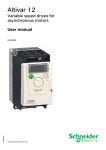
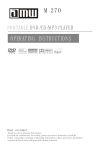
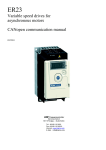
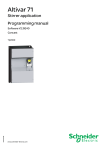



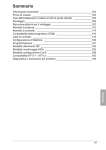
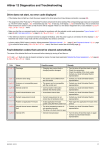
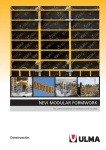
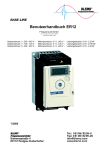
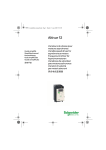
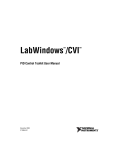
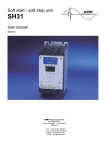
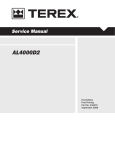
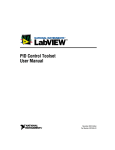

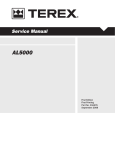
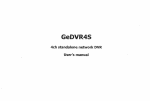
![RessqM, Enhanced Version of RESSQ [Javandel et al., 1984]](http://vs1.manualzilla.com/store/data/005674408_1-e8a4b9f66c80cdc83d847a710e5b4b1f-150x150.png)
